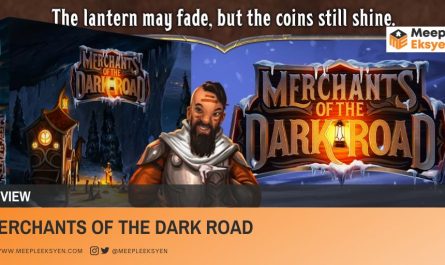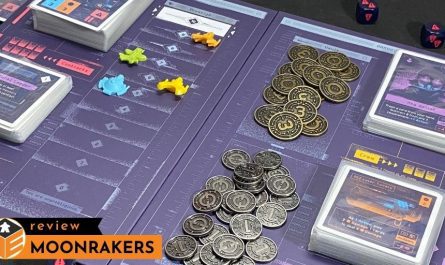Sherlock Holmes, albeit being tossed away by its creator in his later days, is a name known and loved by many. From the uncountable movies and TV shows and never ending pop-culture references, this British detective has undeniable widespread appeal. Its literature is a timeless classic that survived two world wars! So of course, there is a card game system which immortalizes its namesake: the Q System.
Since its release in 2018 on a case-by-case basis (pun intended), Guerra De Mitos (GDM) Games, the original publisher, has been developing more and more cases. We have also once reviewed their two-player game from 2018. According to their website, the current releases also include a junior variant aiming towards younger audiences. There are some spin-offs with the wild west theme to spice it up.
This review is solely focusing on Q System’s main Sherlock line. While GDM Games publishes this puzzle game in Spanish, Enigma Studio is responsible for the English edition. Will this game quench the inner detective within us? And so, the case is afoot!
Disclaimer: I casually enjoy euro games and miniature wargames, Print-and-Play maker, and a big fan of solo games or its variants. This statement will give you an overview of what kind of bias I might have while writing.
Q System in a glance
A compact system
The Sherlock main line games consist of only a deck of cards, while also including an instruction booklet that doubles as a storybook. I guess this arrangement stays true for other Q System’s lines. The aim of the game is evidently to go through all the clues. They are represented in a set of 32 cards.
Afterwards, players open the sticker on the booklet to answer questions. Then, they gain points from both their answers and their handling of the clues, which represents how well they solve the case. And that’s it! The game should run for approximately an hour or so. However, it went much faster than expected when I solo-ed Q System. We’ll talk about the reasons soon.
Comments on appearance
In general, I appreciate the illustrations in this Sherlock mini-game. They are pretty good and able to present the clues in each card as more than just a wall of text. Whether it’s newspapers, clippings, investigation notes, or various other personal effects, these artworks add the thematic immersion of the overall game.
Playing Sherlock, Not as Sherlock
From my previous sessions, I understood that we do not play as Sherlock himself. Q System brought me into the setting as someone who aspired to be like him. The scoring rates players and ranked them according to the figures appeared in the franchise. Your score can range from Inspector Lestrade and up to Sherlock. Of course, the last name becomes the highest tier in this game.
When playing with multiple players, each will get three clue cards to start with. To scale up, the cards dealt will get reduced to two cards per player if there are six or more people involved. For your information, this Sherlock line from Q System supports up to eight players.
During each turn, players play a card face up and state it as a significant clue. Alternatively, they can discard a card face down, too.
Either way, the active player then draws a new card from the deck. Going onwards, the turn continues until all the cards from the deck are either presented as clues or discarded. The latter one is an essential aspect of this game. Besides the function to cycle unimportant clues that deduct your points at the end game, players need at least six cards in their discard pile. Else, everyone loses the game.
Discarding — an important mechanic in Q System
Discarding cards becomes an interesting point here. The mechanic relies on the players’ judgement, determining whether some clues are important or not. Discussion and cooperation become key factors in the game, although thematically, nobody should disclose the discarded cards until the phase when they peel off the stickers from the instruction booklet.
Interesting narratives from the scenarios
Sherlock’s chronicles are, as mentioned, a riveting masterpiece from Sir Arthur Conan Doyle. In the same fashion, the stories told in this detective game are also engrossing. I tried three different scenarios: Last Call, Tomb of the Archaeologist, and Death on the 4th of July.
The outcome can be pretty much unexpected, as the stories are pretty loose clue-wise, and open-end narrative is limited. Henceforth, the resolutions become interesting. However, one of the scenarios above ended up being too surprising up to the point it annoyed me afterwards — I feel like it’s too far-fetched, but your mileage may vary.
The downside: Replay value
Just like other puzzle games in the market, Q System’s replay value is blatantly stated. This is a game that will find the way to your table once only. To put it another way, after reaching the resolutions, there will be no more discovery out of the game. Well, at least up to the point you have forgotten the whole story and become interested to give it another go. Another recommended and fun alternative is to watch your friends try to become Sherlock without you influencing their decisions.
VERDICT
The Q System used in the Sherlock line is interesting if you are into some thematic storytelling games. The intriguing mechanic utilizes only 32 cards and simple actions. In addition, the stories are narrated creatively. It really encourages you to fill in the blanks by yourself.
All of those are parts of the experience to be like Sherlock. In most cases, however, this puzzle is only playable once. Perhaps, it would be more well-suited for a game in a café or any other public spaces that welcome higher player traffic.
Do you love board games as much as we do? Support us!
Thank you for reading our articles! If you enjoyed our work and want more captivating board game contents, make sure to:
👉 Follow us on our social media — you can find us on ![]()
![]()
![]() Click one of the icons to land on our social media, or find us @meepleeksyen there, it’s just a click away! Stay updated with our latest board game reviews and previews by following us on those platforms 📱👍
Click one of the icons to land on our social media, or find us @meepleeksyen there, it’s just a click away! Stay updated with our latest board game reviews and previews by following us on those platforms 📱👍
💬 Do you have contrasting opinions? Leave a comment — share your thoughts with us, we’d love to hear (or read) yours! Have you played this game before? Did you have something similar as well? Or perhaps, something more personal, like what are your favourite board games? Let’s discuss in the comments below!
🙏 Support Us! Your generous support can help us produce even better content in the future. If you love what we do, consider making a donation to our blog. Every contribution counts and means a lot to us! You can either donate locally with Indonesian Rupiah (IDR) via Trakteer ![]() or for international readers with another currency through Buy Me a Coffee
or for international readers with another currency through Buy Me a Coffee ![]() It helps us to survive, too! 💰 Click one of the button below 👇
It helps us to survive, too! 💰 Click one of the button below 👇





